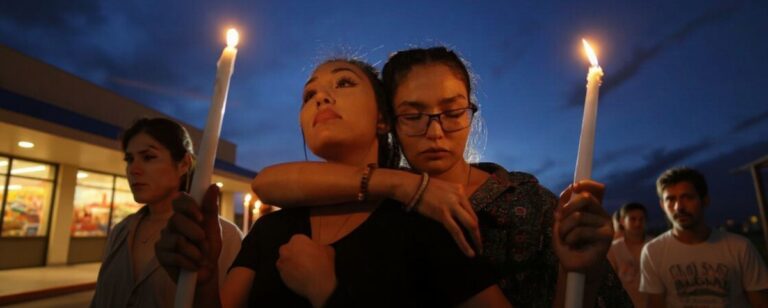
Last weekend, two mass shootings took place in the US. In El Paso, Texas, a 21-year-old gunman stalked and attacked shoppers in a Walmart store, leaving 20 people dead and 26 injured. In Dayton, Ohio, another individual fatally shot his sister and eight others with an AR-style pistol and up to 250 rounds of ammunition. In 13 hours, a total of 30 were dead in the two cities.
These massacres join the country’s crisis-level list of mass shooting statistics: Dayton’s bloodshed is the 32nd mass shooting by firearms in the country this year alone. From 1966 to 2012, nearly one-third (31 percent) of the gunmen who carried out mass shootings worldwide were American.
As a high school student in the US (or anywhere else, really), these figures are baffling. How is it possible for a world superpower, a beacon of democracy and a cultural powerhouse, to experience so many mass shootings?
 Mass shootings aren't exclusive to the US, seen through the terror attack on a New Zealand mosque. Source: Marty Melville
Mass shootings aren't exclusive to the US, seen through the terror attack on a New Zealand mosque. Source: Marty Melville
Depending on who you ask, there are many different things driving this dreadful phenomenon. As an event that damages so many families and communities, it’s natural for young people to want to know more and help. Studying these courses at college or university can position you better to do so:
Political science
In the wake of the attacks, President Trump warned of “the perils of the internet and social media”. He denounced white supremacy, but as news reports noted, not the ease of access to firearms. Links have also been drawn between the recent shootings and video games.
“In one voice our nation must condemn racism, bigotry and white supremacy,” Trump said on Monday at the White House. “These sinister ideologies must be defeated,” added the President.
Political science is the systematic study that looks into the state and systems of government, as well as the scientific analysis of political activity and behaviour – including many of the “ideologies” mentioned by the US President. Its contemporary study is broader than just the examination of the state, its organs and institutions. It includes “all the cultural, and psychological factors that mutually influence the operation of government and the body politic”.
Security & Counter-terrorism studies
This refers to courses – usually at graduate school – that deal with the security issues facing communities, either domestically, internationally or both. Classes usually focus on current debates and controversies around the subject, its political context and follows with an examination of the latest counter-terrorism measures.
Many have argued that if the perpetrators of mass shootings had a history or links to radical Islam, they would have been branded as terrorists. Many academics agree with this and this course would be a good way to learn of the potential alternative responses that would have taken place if the US treated it as such.
Psychology
Some of the key solutions offered by the Republican party – and supported by the President – include the confiscation of firearms from the mentally ill, as well as enacting mental health laws that would involuntarily confine people at risk of committing violence. Experts, however, have argued that its astronomical number of guns is more likely to be the cause behind mass shootings.
So is this formulation by the Republicans based on any concrete psychological grounds? Is forced drugging and confinement a possible solution or merely wishful thinking? Are Democrats right in their push for more gun control laws?
A good way to find out is to major or minor in this scientific discipline that studies mental states, processes and behaviour in humans and other animals.
Or consider specialising in forensic psychology, which studies the interaction of the practice and the law including fundamental legal principles and relevant jurisdictional considerations to be able to interact appropriately with judges, attorneys and other legal professionals.
Liked this? Then you’ll love…
Is it safe to study in New Zealand post-Christchurch?
Fees, guns & a changing world: Why foreign students aren’t enrolling in this US uni







